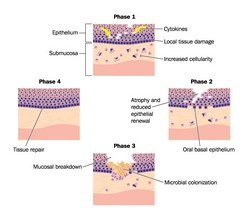Oral microbiota and mucositis
The underlying aetiology of oral mucositis, an inflammatory reaction of the mucosal tissues in the mouth following chemo- and radio-therapy, has been largely unexplored. Accumulating evidence suggests the involvement of the oral microbiota. In this context, the EU-funded MUCOSITIS PLATFORM (Development of a multidisciplinary platform for the screening of new preventive and therapeutic strategies against oral mucositis) project investigated the implication of mouth bacteria in the aetiology of oral mucositis. Scientists have developed a novel disease model, which overcomes the cytotoxicity limitations associated with microbe-epithelial in vitro interactions. By separating microbes and epithelial cells with a porous membrane coated with a mucin layer, researchers have managed to extend their co-culture by three days to avoid infectious conditions. Results in this model have shown that certain mouth bacteria, Klebsiella and Lactobacillus strains, significantly reduce the wound healing capacity of the cultured epithelial cells. In contrast, a promoting wound healing impact has been seen in cultures containing various strains of Streptococcus. Irradiation, as well as various chemotherapeutic agents, had an impact on the formation, composition and virulence of mouth microbiota, which might have an effect on epithelial wound healing. To validate the in vitro findings, the researchers have studied the oral microbiome of patients with head and neck cancer receiving radiotherapy. Results indicated a correlation between the shifts in the buccal microbial community and the patients' normal oral functioning. In particular, the abundance of Prevotella spp. and Atopobium spp. correlated strongly with the severity of oral mucositis. Thus, these bacteria could be used as microbial biomarkers for this disease. During the development of mucositis, the epithelial barrier is disrupted, allowing microbiota to invade underlying tissues. In this regard, they discovered a soluble fragment of the cell adhesion molecule E-cadherin that could be a predictive marker of mucositis in oropharynx cancer patients who have undergone radiotherapy. Drug screening revealed that the plant-derived polyphenolic compound 8-PN delayed the onset of radiation-induced oral mucositis in the mouse model. In conclusion, the project found the link between microbiota composition and mucositis severity. The data can be used for patient stratification and disease management strategies.







